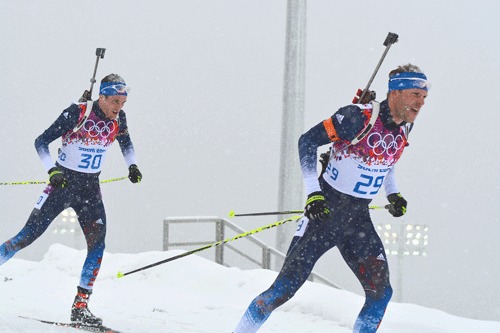Individual medals will have to wait

Lowell Bailey of Lake Placid, right, and Paul Smiths native Tim Burke ski in the men's 15-kilometer biathlon mass start today at the Sochi Winter Olympics in Krasnaya Polyana, Russia. Photo by Chris Knight
KRASNAYA POLYANA, Russia – The United States’ pursuit of its first individual Olympic biathlon medal will have to wait another four years.
Locals Tim Burke and Lowell Bailey placed 21st and 23rd, respectively, Tuesday in the men’s 15-kilometer mass start, the last individual event of the Sochi Winter Olympic Games.
Burke posted a time of 44 minutes, 55.9 seconds to finish 2:26.8 behind gold medal winner Emil Hegle Svendsen of Norway, who crossed the line in 42:29.1. The silver medal went to Martin Fourcade of France in 42:29.1, while Ondrej Moravec of the Czech Republic won the bronze in 42:42.9.
The race took place amid heavy wet snow and foggy conditions at the Laura Cross-Country Ski and Biathlon Center. It was originally scheduled for Sunday but was postponed four times due to fog.
The mass start features the top 30 athletes, based on their results in the Olympics and on the World Cup tour, all starting simultaneously. Competitors ski five 3-kilometer loops, interspersed with four bouts of shooting, two prone and two standing. For each missed target, the athlete must ski a 150-meter penalty loop.
Burke missed a total of four shots, including two in the first prone.
“It was really frustrating,” he said. “I felt good. I was surprised I was missing. They felt like good shots. And then on the second loop I saw my coach and he showed me on the board that everything was low, so I had to adjust for that in the second shooting.”
Asked if the snow or fog affected his shooting, Burke said conditions in the range were OK.
“You could see the targets fine,” he said. “The hardest part was the snow getting in your sights, which makes it look a little different. The worst part of the visibility was on the downhill because glasses were of no use today after about the first 100 meters. It was tough to see going down in a group in some pretty tricky conditions.”
Bailey crossed the finish line in 45:19.2, 2:50.1 back. He missed five shots including two in the first prone, just like Burke.
“Not my best day for sure,” he said. “I don’t know what happened in first prone. I don’t think I’ve missed two in a stage all year. That’s not the way you want to start out. Nothing really came together.”
Bailey came into this race riding the high off his eighth-place finish in Thursday’s 20-kilometer individual, the best-ever Olympic finish in biathlon for the U.S. Did he lose some of that momentum from the multiple postponements of the mass start?
“No, I was ready to go,” Bailey said. “I had a really good feeling and prep going into this. The conditions are what they are, but it’s the same for everyone. I could have done better.”
As was the case at the Vancouver Olympics four years ago, there was plenty of speculation before this games about whether the U.S. could finally break through to win an Olympic medal in biathlon. Burke and Bailey were seen as the best chances to reach that plateau, but the individual events of the Sochi games are now a thing of the past, and they didn’t get it done.
“We didn’t get a medal, so that’s pretty disappointing for us,” Burke said. “Of course, that was the goal, but we chose to do one of the hardest Winter Olympic sports and the most competitive one. That’s the way it goes. It’s not easy.”
Still, Burke said he doesn’t have any regrets.
“I’m not looking back saying, ‘I wish we had done this differently or whatever.’ Some things out of my control didn’t go my way, some things in my control didn’t go my way. That’s the way it goes.”
The two remaining events for Burke and Bailey in these games are Wednesday’s mixed relay, a first time Olympic event that features two women and two men from each country, and Saturday’s men’s 4×7.5-kilometer relay.




